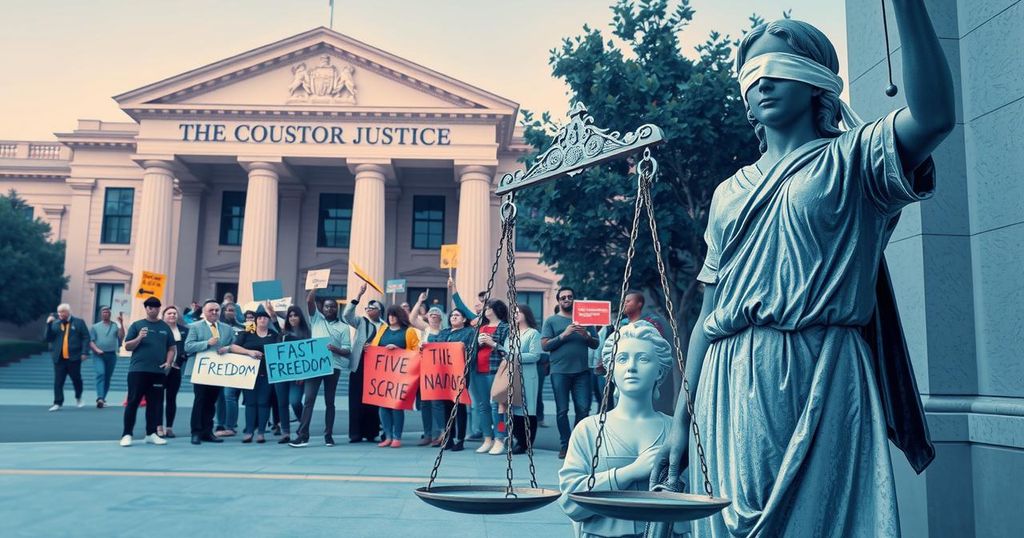Activists rallied for Badar Khan Suri, a detained Georgetown scholar, claiming his detention violates his free speech rights. His arrest aligns with Trump’s campaign against those supporting Palestinian rights. Advocates criticize his transfer between states and the government’s unfounded charges of terrorism, emphasizing constitutional protections and urging for his immediate release.
In a striking show of solidarity, advocates rallied outside a federal courthouse in Alexandria, Virginia, to demand the release of Badar Khan Suri, a Georgetown University scholar detained by the U.S. government. “Free him now. Free him now,” echoed through the crowd as lawyers presented arguments in what many consider a violation of Suri’s rights based on his outspoken support for Palestinian freedoms.
Badar Khan Suri, who has been held since March, faces deportation under President Trump’s initiative aimed at punishing non-citizens accused of inciting “anti-Semitism” on college campuses. His wife, Mapheze Saleh, made an emotional appeal, stressing the toll on their three children. “Why is this happening to him?” she asked, highlighting the administration’s campaign against individuals who advocate for Palestinian rights.
His academic work focused on peace-building efforts in Iraq and Afghanistan until the government accused him of spreading Hamas propaganda and promoting antisemitism online, claims for which they have not provided evidence. Activists—many chanting for Khan Suri’s freedom—stood under a statue symbolizing unbiased justice, their signs critiquing a system they see as overreaching: “Mob bosses disappear people” and “Due process now.”
The courtroom proceedings became mired in discussion over jurisdiction as Suri was abruptly transferred from Virginia to detention centers in Louisiana and then Texas. Critics argue that this tactic is intended to isolate detainees from family and legal support, particularly when those states generally lean conservative in court matters.
Khan Suri’s legal team passionately argued that he should be moved back to Virginia for the sake of proximity to his family and representatives. Samah Sisay, a staff lawyer with the Center for Constitutional Rights, expressed reasonable hope that the court would recognize these tactics as unlawful. Meanwhile, the government pushed for the case to move to Texas, igniting tension in the courtroom.
Judge Patricia Tolliver Giles expressed skepticism and demanded an explanation from the government about Suri’s transfer. Advocates point to case law supporting their hope, given that similar cases have seen rulings in favor of detainees.
Since Trump’s return to office, his administration has increasingly scrutinized foreign students involved in protests, with Secretary of State Marco Rubio suggesting that many visas were revoked for such actions. The case of Badar Khan Suri, however, has received particular scrutiny and attention. Not charged with a crime, his supposed connection to a terrorist group centers around familial ties rather than demonstrated wrongdoing.
Critics, including legal experts, highlight that familial connections should not serve as grounds for deportation. Khan Suri’s father-in-law, Ahmed Yousef, has not aligned with Hamas for years, and disputing the case’s legitimacy, they emphasized the First Amendment’s protection of speech and association.
“This isn’t the America we want to be,” lawyer Hassan Ahmad remarked, emphasizing the potentially dangerous precedent this case sets. Eden Heilman from the ACLU voiced similar concerns, stating that targeting individuals for personal connections opens a “very scary premise” regarding constitutional rights.
Outside the courthouse, some supporters reflected on Suri’s social media use, noting that he consistently condemned violence against Palestinians and has not expressed support for Hamas. With tensions rising, Trump’s comments about Gaza have drawn criticism for perceived calls for ethnic cleansing.
Congressman Don Beyer attended the hearing, asserting, “It is Kafkaesque that somebody can be kidnapped without reason,” reinforcing the call for accountability and transparency in Suri’s case. Anita Martineau, a rally participant, echoed the need for collective action against what she termed unconstitutional practices tearing at the fabric of American democracy. “American people, citizens or residents, they all need to stand up,” she asserted.
As the focus on Khan Suri’s plight continues, activists remain committed to showcasing solidarity not only with him but also with the broader struggle for Palestinian rights, demonstrating an unwavering determination amidst escalating tensions.
Original Source: www.aljazeera.com



